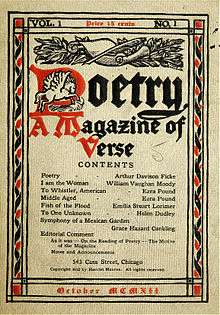Poetry Foundation
Coordinates: 41°53′43.8″N 87°37′47.9″W / 41.895500°N 87.629972°W
|
Poetry Foundation building | |
| Founded | January 1, 2003 |
|---|---|
| Type | Independent literary organization |
| Location |
|
| Services | Publication; Conferences; Library |
Key people | Henry S. Bienen, President |
| Mission | "To raise poetry to a more visible and influential position in American culture" |
| Website |
poetryfoundation |
Formerly called | Modern Poetry Association |
The Poetry Foundation is a Chicago-based American foundation created to promote poetry in the wider culture. It was formed from Poetry magazine, which it continues to publish, with a 2003 gift of $200 million from philanthropist Ruth Lilly.[1]
According to the foundation's Web site, it is "committed to a vigorous presence for poetry in our culture. It exists to discover and celebrate the best poetry and to place it before the largest possible audience."[2] In partial furtherance of this objective, the Foundation runs a blog called Harriet . Poets who have blogged at Harriet on behalf of The Poetry Foundation include Ange Mlinko, Christian Bök, Stephen Burt, and Rigoberto González. In addition, the Foundation provides several awards for poets and poetry. It also hosts seminars, readings, exhibitions, and a poetry library.
The Poetry Foundation is a non-profit, charitable, 501(c)(3) organization. Donations are tax-deductible.[2]
History
The foundation is the successor to the Modern Poetry Association (previous publisher of Poetry magazine), which was founded in 1941.[3] The magazine, itself, was established in 1912 by Harriet Monroe. Monroe was its first publisher, until her death, and an art critic for the Chicago Tribune. Today, the Poetry Foundation is one of the largest literary foundations in the world.[2]
In 2003, Poetry magazine received a grant from the estate of Ruth Lilly originally said to be worth over $100 million, but which grew to be about $200 million when it was given out. The grant added to her already substantial prior contributions.[4]
The magazine learned in 2001 that it would be getting the grant. Before announcing the gift, the magazine waited a year and reconfigured its governing board, which had been concerned with fund-raising. The foundation was created, and Joseph Parisi, who had been editor of the magazine for two decades, volunteered to head the new organization. Christian Wiman, a young critic and poet, succeeded to the editorship in 2003. Parisi resigned from the foundation after a few months.[4]
The new board used a recruiting agency to find John Barr, a former executive and published poet, to head the foundation.[4] Robert Polito, the respected poet and critic who founded and directed the graduate writing program at the New School, replaced Barr in 2013 and served until 2015. In December, 2015, Henry S. Bienen, President Emeritus of Northwestern University was named President.[5]
Poetry Foundation building
Part of the Lilly grant was used to build the Poetry Center in Near North Side, Chicago. The Center, designed by John Ronan, opened in 2011. The center holds a library open to the public, houses reading spaces, hosts school and tour groups, and provides office and editorial space for the Poetry Foundation and magazine.[6]
Programs
Events
The Poetry Foundation hosts a schedule of events. These include poetry readings, staged plays, artist collaborations, and exhibitions.
Harriet Monroe Poetry Institute
The Harriet Monroe Poetry Institute provides an independent forum to convene discussions about poetry. Poets, scholars, educators and others are invited to share ideas about the intellectual and practical needs of the poetry form, and to generate solutions to benefit the art.
Poetry Out Loud contest
The Poetry Out Loud recitation contest was created in 2006 by the Poetry Foundation and the National Endowment for the Arts to increase awareness of poetry through performance and competition. It engages high school students in public speaking and the literature and performance of poetry. The contest gives out a $20,000 award to the first-place winner, $10,000 for second place and $5,000 for third place. Participating schools also receive cash prizes.
Awards

The Foundation's awards seek to promote and bring recognition to poets and poetry. The Pegasus Awards are a series of awards to "under-recognized" poets and poetic forms (the winged horse, Pegasus, was used to illustrate the early magazine covers). They are generally given annually but may be given less often. The Children's Poet Laureate is a two-year appointment to an author of children's poetry. The Ruth Lilly Prize is an annual award given for lifetime achievement in poetry to U.S. poets. The Ruth Lilly Poetry Fellowship is awarded to aspiring U.S. poets to support study and writing.
Library
The 30,000-volume library presents a wide selection of modern and contemporary poetry in English or translation. It includes original author works and rare volumes. It also includes representative samples of earlier eras, and includes a 3000-volume children's section. In addition to the reading room, there are listening booths for poet audio recordings and broadcasts related to poetry and interactive displays. It is open to the public Tuesday through Friday with a children's day on Wednesday.
See also
Notes
- ↑ Fisher, Daniel (17 January 2011). "No Rhyme Or Reason". Forbes Magazine: 30.
- 1 2 3 "About The Poetry Foundation". The Poetry Foundation. Retrieved February 15, 2007.
- ↑ "The Poetry Foundation: History and Mission". The Poetry Foundation. Retrieved 30 September 2013.
- 1 2 3 Goodyear, Dana (February 19, 2007). "The Moneyed Muse: What can two hundred million dollars do for poetry?". The New Yorker. Condé Naste. Retrieved 30 September 2013.
- ↑ http://www.poetryfoundation.org/foundation/press/2015/186522
- ↑ Kamin, Blair (2011-06-24). "Much more than a one-liner". Cityscapes. Chicago Tribune. Retrieved June 24, 2011.
External links
- Official website
- First Foundation president (2003—2013) John Barr's annual letters to the poetry community